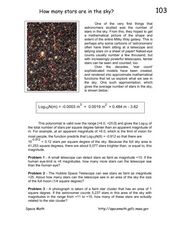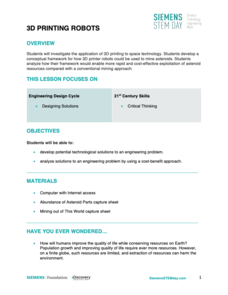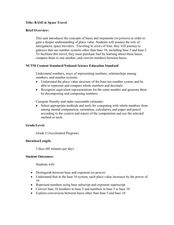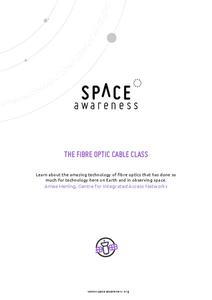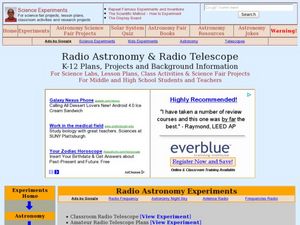Curated OER
The Solar Neighborhood within 17 Light Years!
For this distance between stars worksheet, learners plot the distance between the sun and 11 other stars on a 2 dimensional grid using a protractor and a ruler. They determine the distances between various stars and they find the...
Curated OER
Counting the Stars in Draco
In this counting stars instructional activity, students construct a histogram for stars in a given star field using their apparent magnitude. Students answer 5 questions using their tabulated data and histogram to answer questions about...
Curated OER
How Many Stars are in the Sky?
For this star count worksheet, students solve three problems using a given polynomial and its logarithm to determine the number of stars in a given area.
Curated OER
Astronomy and Me: Moons Over New Haven
Third graders study the features of different moons orbiting the planets. For this astronomy lesson, 3rd graders explore the different phases of the moon using an interactive online website. They compare and contrast the features of the...
Curated OER
Capillary Action
In this capillary action worksheet, students follow directions to see the ability of liquids being drawn up into small spaces using beakers, paper, rulers, food coloring and more. Students follow 8 sets of directions and write a conclusion.
Curated OER
Create a Galactic Mobile
Students create a mobile of the Milky Way galaxy. They discover other galaxies beyond the ones we can see. They share their mobile with the class.
NASA
The Atmospheric Filter
What is the difference between a comet and a meteoroid? An educational lesson includes five demonstrations of how the atmosphere can inhibit our ability to measure many things in the galaxy.
Curated OER
Zipping Through Our Solar System and Beyond
Launch your class on an exploration of the solar system. Learners construct solar system models to scale and get a better understanding of our place in the vast void of space. This is a great way for them to cement their understanding of...
Discovery Education
3D Printing Robots
What is water worth to you? The answer probably depends on many different variables. Learners explore the value of water in space and what it takes to transport the resource to locations in a galaxy far far away. They then consider...
NASA
Discovering the Milky Way
What do you call a tiny collection of galaxies? A puny-verse! Young scholars graph data gathered by scientists studying Cepheids. They attempt to identify a relationship between the variables through standard and logarithmical graphing....
Curated OER
The Future of the Milky Way
Students brainstorm ideas about the future of our galaxy. In this space science lesson, students research the three main events happening in the Milky Way. They write a report about their findings.
Curated OER
Stars and the Sun
Sixth graders research and state the differences between different stars and the sun. They tie the magnificence of space with the science fiction novel, "I Robot." Several worksheets and discussions are also covered within this lesson plan.
Curated OER
The Planet Earth
Students explore the planet Earth, outer space, and Earth's axis. They demonstrate reading comprehension skills, including literal meaning, inference and critical analysis.
Curated OER
Astronomical Scales
Young scholars describe the different units of measurement. In this space science lesson, students calculate astronomical distances using a scale. They explain the significance of using scientific notation in expressing very small or...
Curated OER
Solar System Activity Pages
In this solar system activity, students complete a word search, crossword puzzle, word scramble, and cryptogram all relating to the solar system.
Curated OER
BASE-ic Space Travel
In this 3-day place-value lesson, upper-elementary kids investigate the base 5 and base 2 systems as an introduction to exponents and powers. They create a pocket chart to help ground their understanding of bases, exponents, and powers,...
Curated OER
The Battle for Ultimate Power
Learners gain an understanding of how the powers of 10 and scientific notation can be used to represent the scale of things in the universe. They relate the number of stars in the universe to the number of grains of sand on Earth's beaches.
Space Awareness
The Fibre Optic Cable Class
Many people know that fiber optics are used in delivering the Internet, but are surprised to learn they are also used in astronomy. Scholars explore light, reflection, and fiber optics through hands-on activities. They discuss methods of...
Vosonos
Interactive Minds: Solar System
Travel through space as you learn about the galaxy, solar system, planets, and much more. An extensive resource for studying astronomy in upper-elementary and middle school classrooms.
NASA
Stellar Fingerprints and Doppler Red Shifts
Young scientists observe the spectra of elements and compare that to the Doppler effect. Hook scholars from the beginning all the way to the extension activities in this 5E-format lesson.
Curated OER
Learning from Light: The Big Bang
Young scholars explore what astronomers are able to examine our galaxy and universe by examining light. They explore in this sub-unit the formation of the universe, commonly called "The Big Bang," and it follows studying from the Light:...
Curated OER
Worksheet 24 Spring 1996
In this math worksheet, young scholars find all the vectors in three dimensional space that have the length of 4. Also, the first and third components are the same. Finally, the second component is the sum of the first and third components.
Curated OER
Radio Astronomy and Radio Telescope
Students construct a simple radio telescope. In this astronomy lesson, students explain how this telescope works and what information it collects.
Curated OER
Great Explorations: To the End of the Earth and Beyond
Students analyze the factors that affect exploration such as religion, trade, territorial expansion, and science. In this Great Explorations lesson, students determine the names of famous explorers as well as their routes and...




